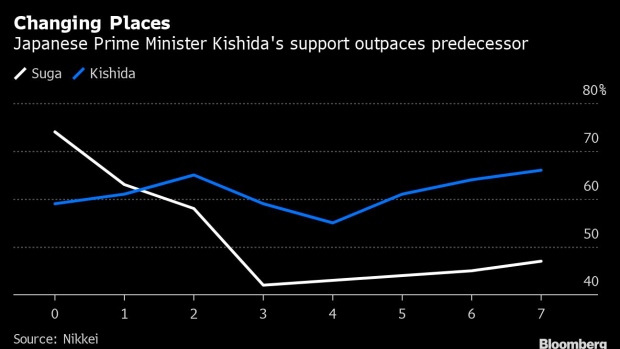Jun 6, 2022
Putin and Covid May Help Kishida Keep Japan’s Top Job for Years
, Bloomberg News

(Bloomberg) -- Fumio Kishida’s emergence last year as Japan’s third prime minister in 13 months prompted worry that Tokyo was sinking into another period of revolving-door leadership. He now looks increasingly likely to govern the country for years.
Kishida’s tough stance on Russia’s invasion of Ukraine and cautious response to the omicron variant surge of the coronavirus have swung previously skeptical voters behind the former foreign minister, with many media surveys showing support rates at their highest since he took office in October. A victory in upper house elections next month would give the premier as long as three years without the need to face another test at the polls.
“Kishida is doing things very flexibly,” said Mieko Nakabayashi, a former lawmaker turned politics professor at Waseda University in Tokyo, who cited his sensitivity to public opinion on virus measures, and willingness to shift on security policy. “He’s not going to extremes or sticking with stubborn beliefs. He is really trying to be flexible, listen to the people and calculate the situation.”
Kishida’s success among the public is surprising considering his reliance on lawmakers from the ruling Liberal Democratic Party to lift him into the job vacated by Prime Minister Yoshihide Suga. That support helped him overcome a better-known and more popular challenger, Kono Taro, who had overseen the country’s initial vaccine rollout.
When Kishida took office, one poll showed his cabinet with the lowest initial approval rating since 2008, well below Suga or this long-tenured predecessor, Shinzo Abe. Kishida led the LDP to an unexpectedly robust general election win in October, only to see his public support fall further as omicron hit and markets swooned.
Japan’s Kishida Seeks Fresh Growth Via ‘New Capitalism’ Plan
Things began to turn around for Kishida after Russia launched its Feb. 24 attack on Ukraine. His rapid imposition of sanctions on Moscow and decision to dispatch aid to Kyiv, including nonlethal military equipment, made the new leader look decisive.
In response to public fears about China prompting a similar crisis over nearby Taiwan, Kishida pledged substantially more military spending. The moves were surprisingly hawkish for Kishida -- who was widely viewed as dovish on foreign policy -- as well as Japan, which is constitutionally committed to pacifism as part of reconciliation efforts after World War Two.
“Voters now feel more reassured by a more realistic security policy,” said Tsuneo Watanabe, senior research fellow at the Sasakawa Peace Foundation in Tokyo. “Having this come from the liberal wing of the LDP makes it all the more reassuring.”
Although business leaders criticized Kishida’s decision to halt new foreign arrivals as excessively cautious, the policy played well with an elderly population worried about the health risks of Covid. The country boasts far lower Covid death rates than its Group of Seven peers, as Japan finally cracks its doors open to foreign tourists.
Kishida’s diplomatic experience has also helped him appear at ease in summits with US President Joe Biden and other global leaders.
“He’s extremely clever,” said Shouji Nishida, a fellow LDP lawmaker. “He looks around him and when others say, ‘O.K.,’ he moves, one step behind. He’s a very Japanese-consensus type.”
Japan’s Kishida Gets Lowest Support for a New Premier Since 2008
A long stretch in power, however, would test his ability to make a success of his “new capitalism” plans, which are aimed at reducing social disparities while encouraging economic growth. Set to be approved by the cabinet Tuesday, the strategy calls for diverse measures including enticing households to switch from savings to investment, as well as bolstering support for startups, innovation and digitalization.
“As an outline, I would give it a passing grade of 70-80%,” said Harumi Taguchi, principal economist at S&P Global Market Intelligence. “The problem is how it’s going to be put into practice,” she added, noting that previous plans for reform had been left largely untouched under former premier Abe’s administration.
A poll carried out by the Asahi newspaper in May found 56% of respondents said they didn’t have positive expectations for his economic policies. Another carried out by broadcast news network JNN June 4-5 found 58% were dissatisfied with the government’s response to rising prices.
Kishida has stayed clear of the scandals and gaffes that plagued the administrations of Abe and Suga. The most common reason given for supporting his cabinet in this month’s survey by the Nikkei newspaper was “trustworthiness.”
That clean image and a strategy of promising both a stronger military and a more equal society has left little room for the opposition parties either right or left of the LDP to attack him, or appeal to voters in their own right. The latest polls show none of them boast support of more than single figures.
Yu Uchiyama, a professor of politics at the University of Tokyo, attributed Kishida’s support to his ability to create an “impression of stability” among voters.
“He hasn’t done anything very special, but he hasn’t made any big mistakes,” Uchiyama said. “The upper house election is likely to go well for the LDP, and there won’t be a national election for a while, so he’s likely to be re-elected as party leader, which means there’s a good chance the Kishida administration will be a long one.”
©2022 Bloomberg L.P.







